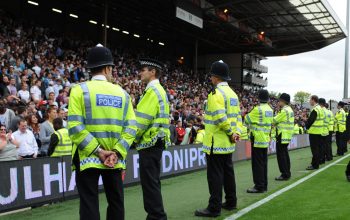It may seem bizarre to the uninitiated to hear Tottenham Hotspur supporters describing themselves as the ‘y*d army’.
Spurs are considered to be a Jewish club, and in the 1970s this made them an easy target of antisemitic chanting.
Opposing fans would sing a version of ‘Spurs are on their way to Wembley’, replacing “Wembley” with “Auschwitz”. Others would simply hiss to mimic a gas chamber.
Instead of supporters rejecting their supposed Jewishness, they responded by reclaiming the word ‘y*ds’, one of the slurs shouted at them.
But now the club has asked fans to reassess their use of it.
In 2019, Tottenham engaged with 23,000 fans in a consultation where 94 per cent of respondents acknowledged that the y word could be an antisemitic term. Supporters who used the term largely expressed a willingness to reconsider if other fans found it offensive.
In addition, 35 per cent of Jewish respondents who did not chant the word found it offensive.
Last month the club released their proposed next steps.
The statement said: “The adoption of the y word by our supporters from the late 1970s was a positive response to the lack of action taken by others around this issue.
“An increasing number of our fans now wish to see positive change again with the reduction of its use, something we welcome and shall look to support.”
Some, such as comedian and anti y word campaigner David Baddiel, have argued that the use of the word at matches perpetuates its use outside the footballing context. It might otherwise have faded out of use.
But a large minority of supporters – 33 per cent of those who took part in the consultation – still chant the y word. For them the word simply means ‘Spurs’.
The chant has become so intertwined with Tottenham’s identity that the Oxford English Dictionary added “a player or supporter of Tottenham Hotspur” to their definition of the word in 2020.
But for many the y word is still a term of racist abuse, one which was most notably used by the fascist Oswald Mosley’s black shirts.
A Jewish club?
The club’s link to the Jewish community is clear in some ways.
Their last three chairmen were Jewish, and many Jews moved from the East End to North London in the late 19th and early 20th centuries.
But Spurs’ link to the Jewish community is only as strong as their North London rivals Arsenal. Both are estimated to have a fanbase which is five per cent Jewish.
So why did the perception stick for Spurs and not Arsenal? It’s unclear.
Some supporters suggested it could stem from the fact that Spurs’ Jewish supporters tended to be working-class, which made them more visible than affluent season ticket holders.
Another said Spurs had more Jewish fans in the early days as one could get a direct tram from the East End to White Hart Lane, but would have to change to get to Highbury.
Either way, it led to antisemitic chants and the use of the y word as a badge of honour. For some Spurs supporters this justifies the chant’s continued usage.
Robert Chevins, a Spurs supporter since 1975, said: “[The chants were] a way of even non-Jewish people identifying and saying: ‘you’re using that as a derogatory term, but we’re owning it, we’re taking it over, we’re proud of our Jewish heritage’ and I think that’s great.
“It was never meant by non-Jewish fans to be derogatory; it was more like a laugh.
“The feeling I get [as a Jewish man] when I see these people singing that song is indescribable. I feel proud. I feel somewhat defended. And wanted.”
Chevins said removing the chant wouldn’t “make a blind bit of difference” to those who would participate in antisemitic abuse.
He said: “That kind of person who’s going to sing about Auschwitz… Let’s say I don’t sing that song – is he suddenly going to melt into a free-thinking, glorious human being? He’s not. This type of person is so brainless, why should I change my behaviour for them?”
But Dave Rich, Director of Policy at the antisemitism charity Community Service Trust (CST) thinks it’s time for Spurs supporters to move on.
He said: “Ultimately the y word is a racist term of abuse for Jewish people outside the football context. I can’t think of any other racist insult or racist slur that people would say is alright for football crowds in this day and age to chant, even if they don’t quite mean it like that.
“And the other thing it comes back to is the majority of Spurs fans who use this chant are not Jewish. You’ve basically got an overwhelmingly non-Jewish group of people chanting this word and saying: ‘we’re reclaiming this word’, well I’m sorry, but it’s not for you to do that.”
Rich pointed out that while authorities tolerated racist chants in the past, there are now other ways to deal with the issue.
Ivan Cohen, a Spurs supporter and associate professor in finance and economics, said he thought CST does a good job in general, but that pursuing the issue was “overkill”.
“The word y*d simply means ‘Jew’. It has no value association. Even when the black shirts used it, it would never just be “y*d”, it would be “dirty y*d” or whatever.
“It’s not a racist chant. When you shout ‘y*d army’ at Spurs it’s the same as shouting ‘come on you Spurs’. There’s nothing negative about it. What’s negative about “Jermaine Defoe, he’s a y*ddo”? They’re identifying him as a Spurs man.”
Will it end?
In the past, police have attempted to intervene when Spurs supporters chanted the y word. In 2013, three fans were arrested, but their charges were dropped as the context was not “threatening, abusive, or insulting”.
Now the club is taking charge.
Their ‘next steps’ include creating a web page which publishes further reading, asking older fans to educate younger ones with less exposure to the word outside football, and reiterating that they would not engage with Twitter handles or sell merchandise including the y word.
However, attempts to quash the word seem to encourage fans to sing it more. At the Wolverhampton match, the first after the release of the ‘next steps’, supporters could be heard singing it less than three minutes into the match.
Spurs are also notorious for chanting “we sing what we want” or “the thing I love most is being a y*d” in response to attempts to ban it or phase it out.
But it seems the club don’t think this is a battle they can lose.
At a time when football players and referees kneel for racial equality, and other teams across sports have had to reconsider aspects of their identities, ‘y*d army’ could seem like an antiquated team icon which undermines these broader attempts to reach equality, even if the more vicious kind of antisemitism still exists in football.
Mike Leigh, the host of the Spurs show podcast, said: “There’s a big difference between Spurs calling themselves y*d army and the way the word is used by rival fans in a clearly antisemitic way.
“[But] this is the problem – when you ask them to stop using it, they go ‘what about Tottenham fans?’.
“Which is why someone somewhere said: ‘we can’t go backwards and forwards on this, we have to ban it, bang, and be done’.”





